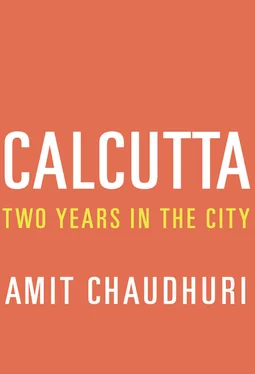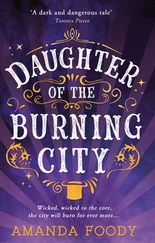But now, during the elections, thirty-four years of the Left would have to take the brunt of the responsibility. Among its many transgressions was the politicisation of institutions, their alleged infiltration by party members or sympathisers; the recalcitrant work ethic, encouraged by fostering militant trade unions; the awful reputation, as a result, of the state among investors.
For now, the early triumph of Left rule, the land reforms that led to the redistribution of rural land, Operation Barga (after bargadar , or sharecropper), is looked upon with impatience. The Left has trumpeted it too frequently. The Left’s other achievement, of creating in Calcutta India’s most tolerant, multicultural, multi-religious metropolis, isn’t remarked upon. The unspoken thought seems to be — what good is coexistence, when mere existence is difficult?
The competition, as we know, was an unmarried woman of humble means, strident voice, and a bludgeoning style. Once of the Congress, Mamata Banerjee was expelled from it in 1997, when she founded her own party, the Trinamool (literally, “grass-root”) Congress.
For a while, she had a shaky alliance with the right-wing BJP, which fell through. The Left had perfected a style of politics that was populist and oppositional (taking to the street to agitate against the Centre’s policies). Mamata borrowed this manner and rhetoric from the Left, and brought to it her own, not always perceivably rational, fervour. In other words, she’s a passionate child of Left politics.
When, in 2009, the Left lost a record number of seats in Bengal, people who’d voted in seven assembly elections but had grown sheltered from the very unpredictability of democracy realised, suddenly, that the Left could lose. This realisation dawned on the Left too. Mamata, in the meanwhile, was about to forge an alliance with the Congress, the party that had once shown her the door, for the 2011 assembly elections, as, by some distance, the dominant partner. Once derided by the Left and even beaten up by its goons (she’d later appear bandaged on television), she was ready to achieve the impossible. It didn’t matter that she had no real policies; a lower-middle-class woman in a white cotton sari and rubber flip-flops (in this guise, she was “didi ”: elder sister), she had vanquished the seemingly punitive patrician system represented both by the Left and the Congress in Bengal. It is, by any standard, an extraordinary feat, turning her, in the most current sense, into a celebrity. McLuhan’s tautology about people who are famous for being famous no longer holds; we now want our celebs, whether they’re English royals, Hollywood stars, or sportspeople, to suffer publicly, to enter detox and to survive it. By the time of the 2011 elections, there wasn’t really a great deal anyone knew about Mamata except, by now, her determination to survive both her outer and, crucially, inner demons; she’d become the protagonist of a great Bengali reality show.
On the 26th, recovered from jet lag, I went out to assess the afternoon preceding the historic event. Not knowing what to do, I made my way to the Institute of Jute Technology on Ballygunge Circular Road, where R and I planned to vote the next day. I’d come here twenty years ago, to vote for the CPI(M) candidate, Anil Chatterjee. I’d had a number of reasons. Firstly, although I was twenty-eight years old, I’d never voted, and felt like growing up. Secondly, there was no alternative in sight. Besides, I was an admirer of Chatterjee’s work in classic Bengali cinema. If he was half as good a Member of the Legislative Assembly as he was an actor — mercurial, full of vitality — he’d be a good choice; even if he wasn’t, I would support him for the hilarious panache with which he’d played a fashion photographer in Satyajit Ray’s Kanchenjunga .
In the elections that followed, I went nowhere near the Jute Technology building. I couldn’t possibly vote for the Left again simply because there was no other option, like a miserable undergraduate who goes to an awful social gathering rather than stay at home. Now, on election eve, the mood was once more different. It felt like there was an unspoken consensus that people would sooner commit suicide than return the Left to power. There was also an undercurrent of agreement that to vote for the Trinamool was to commit suicide. Yet there was a hopefulness in the air, a cockiness, even: the cockiness, say, of Rowan Atkinson in Blackadder Goes Forth , when he’s orchestrated events so that he’ll be in front of the firing squad in the morning, and receive a pardon just as it takes aim. As I entered the deserted Jute Technology college (devoid now of the usually bustling jute technology staff and students), I knew I faced a quandary for tomorrow’s vote. I kept putting off thinking about it; writing about the event was a means of losing my focus on participating in it, in however small a way. But it was my knowledge that I’d infinitesimally influence the event by casting my vote that brought a muted excitement to the idea of writing about it. Yet my plan for voting was depressingly perverse, and deliberately designed to achieve nothing. The CPI(M) candidate in my neighbourhood was the Speaker’s son, Fuad Halim, a young, self-effacing doctor who did social work, a man no one knew and who’d for some inexplicable reason decided to join the fray. His main opponent was the former mayor Subrata Mukherjee, who’d jumped ship and changed parties many times in his career, and for whom neither I nor my wife (who was displaying, on election eve, a more carefree, less tortured resolve in this matter) cared to press the button. But to vote CPI(M) yet again? I felt the exhaustion of one who’s belatedly understood the illusory nature of choice, and feels bitter. Entering, I was politely asked by a young Border Security Force guard to explain myself. Having fobbed him off with some high-falutin nonsense about writing a piece, I went into one of the two halls that would be used for voting (which were otherwise, I imagined, spacious jute technology classrooms), where three polling officers were seated, shirtless, behind a table. With their consent, I began to ask them — especially (out of a sense of symmetry) the one in the centre — general questions. They were government employees with day jobs (the mild elderly man on the left worked in the main branch of the State Bank of India), and they’d done election duty in previous years; like jury members, they couldn’t refuse the job, for which they were paid a modest fee, if asked to do it. The moment I wondered aloud if the elections on the 27th were any different from previous ones, my main interviewee grew unapproachable, bureaucratic, as if he were at a desk in a bank, and clarified tersely that every election, where he was concerned, was exactly the same. When I pressed him, a man who’d been sitting before the vest-wearing officials, myopically going through papers, said firmly I must leave. I’d noticed him, and noticed that he’d noticed me and was pretending, like a consummate actor, to be oblivious; he had a deft, intelligent air, and was sorting out the papers with a ferret-like concentration. “Excuse me,” I said, not to challenge him, but to satisfy my curiosity, “who are you?” “The presiding officer,” he said, not making a big issue about it. An older BSF officer with an automatic gun — moustached, dark, more of a physical presence than the boy outside — took my arm, and, when I respectfully loosened it, very gently escorted me out; in an attempt to be cheerful and subtly difficult, I reminded the three men I’d see them again the next day, and they naturally behaved as if they hadn’t heard.
Further up Ballygunge Circular Road is a beautiful colonial building, the David Hare College, named after the nineteenth-century Scottish watchmaker and fiercely non-evangelical educationist, beloved of Bengalis, both privileged and underprivileged, of the time. The place was lighted up, and swarming with convivial-looking policemen. Given the number of plastic chairs and charged atmosphere, it might have been a policeman’s wedding. I was seated opposite a man in khaki regalia, with epaulettes and tassels, a cap on his head, who was speaking hurriedly into a walkie-talkie. It emerged that the policemen were waiting with bated breath for the “stand down” order, when they could finally go home. It had been a big day. The college not only had a polling booth, but (and this explained the number of policemen congregated there) was a centre at which electronic voting machines were received, and then distributed to ninety-one booths in the area. When I shamelessly informed the busy, nervous-looking khaki-clad man I was a novelist, he said, “What do you write? Are you addressing society’s many problems?” He added, “Literature is a mirror to society.” Policemen in Bengal once had a reputation for being unusually, perhaps unexpectedly, intellectual. Monobina Gupta, in Left Politics in Bengal , mentions that Louis Malle, in Calcutta in 1968, received permission to film a political demonstration from a policeman who was a fan, and who, on meeting Malle, told him he’d “watched Zazie a week ago, at the Metro theatre, barely a stone’s throw away from the protest … Oh, yes, he had completed a course in French and also translated Louis Aragon’s Elsa at the Mirror .” “What kind of problems do you have in mind?” I said, deciding it was best to engage my companion in conversation. “Problems take three forms,” he informed me, while a policeman of lower rank eavesdropped, agog. “You can be born with problems. People can create problems for you. Thirdly, people can make you think you have problems.” He meant me to be perplexed by this last category, and I was. “This group is the most difficult. It fosters the resentment that leads to terrorism.” “But terrorism is not a real concern in this city, is it?” I asked. As we tackled these themes, I noticed him glance with alacrity at an urbane-looking bespectacled gentleman who was approaching us, a bhadralok bureaucrat out of a Ray movie. I was momentarily seized by a nostalgia for Ray’s world; at the same time, a strange thought passed through my head: “If this guy doesn’t recognise me, I might as well give up writing.” This was followed, swiftly, by the pre-emptive voice, “There’s no reason why he should recognise me.” It turned out he was Mr. Chakrabarty of the Calcutta Port Trust. My companion, who, as it happens, was Mr. Chatterjee, an assistant commissioner of the police, introduced me affectionately, as if I were a precocious teenager. “I’ve been telling him that the writer must deal with society’s problems,” he said in English, to which, impeccably, Mr. Chakrabarty replied, “Ah, Mr. Chaudhuri has more than fulfilled his responsibilities to society.” I was struck that it was possible to have a brief exchange on the role of the writer approximately twelve hours before what people had once predicted would surely be a violent election.
Читать дальше












